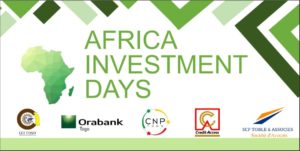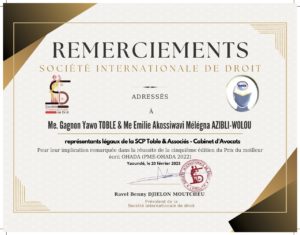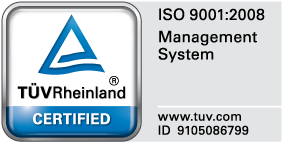For a long time, investment has been considered as one of the main vehicles for the sustainable development of States, mainly the developing countries. African States are consistently working to reform the legal framework for investment in order to appeal and increase the flow of foreign direct investment. It is, in this regard that, the Togolese Investment Code of September 30, 1989, which had become unsuitable for Togolese economic realities and less attractive, was reformed by the law of the 20th of January 2012 on the new Investment Code[1].
While the 1989 Investment Code was reformed 23 years later, it was only 7 years after its entry into force that the 2012 Code was reformed. This shows the Togolese government’s constant willingness to keep up with international investment protection mechanisms and to enhance the flow of foreign investment into the Togolese Republic. Indeed, since the 11th of June 2019, a new Investment Code has been enacted by the Togolese Head of State. This new Code was passed with the overarching objective of promoting, facilitating and especially protecting sustainable and responsible investment in Togo[2].
The new Togolese Investment Code of 2019 defines investment as “the mobilization of capital for the acquisition of movable, immovable, tangible and intangible assets required for the creation of a new business or as part of a program to expand an existing business”[3]. This is a comprehensive and modern definition of the investment. Indeed, the article 2 of the 2012 Investment Code, defined the concept of investment as “the mobilization of a set of capital by any enterprise (…)”. This law only applies to “enterprises” (legal entities) considered as “any unit of production, transformation and/or distribution of goods or services, for profit, legally incorporated in a form recognized by the OHADA’s Uniform Act on General Commercial Law and Economic Interest Groups (AUDCG/GIE) or in the form of a cooperative company”[4]. The clumsiness of this provision lies in the fact that it makes the Togolese legislator State that only legal entities can be regarded as investors. In other words, natural persons do not seem to be concerned since the law only refers to “enterprises” understood as legal entities and not natural persons. However, the same article defines ultimately an investor as “any Togolese or foreign natural or legal person that makes an investment within the national territory”. For consistency purposes, it was necessary to redefine the investment concept in Togolese law, as the new 2019 Investment Code clearly does. Moreover, most French-speaking Sub-Saharan African countries define the concept of “investment” in their Investment Code as a set of capital used by any “natural or legal person (…)”[5].
The reform of the new Togolese Investment Code provides an appealing legal framework for investment while promoting the development of the host country. This new Togolese Investment Code resulting from the 2019 law is enameled with several innovations of which 4 seem to be essential in our view. On the one hand, it is the presence of the major international principles of investment law that constitute investment guarantees (1) as well as the highly incentive measures for private investments (2). On the other hand, the new Togolese Investment Code strengthens the obligations that investors are subject to by taking into account environmental requirements and local content (3). It also includes innovations in the area of investor-State dispute settlement (4) and especially the establishment of an investment promotion agency (5).
- The international principles of investment law in the new Togolese investment Code
It follows from the principle of sovereignty that States have jurisdiction to regulate international investments within their territories. However, the proliferation of bilateral investment promotion and protection treaties (BITs) has led to the emergence of a number of standard rules for the protection of investors in the host State. Ces principes se retrouvent dans le nouveau Code togolais des investissements. Whether they stem from national, regional or international sources, modern laws on investments do include, guiding principles that set out the rights and duties of each of the stakeholders, both for the host State and for the investors. These principles can be found in the new Togolese Investment Code.
a- The principle of equal treatment or non-discrimination.
The principle of equal treatment, also known as the principle of non-discrimination, is one of the most important principles that international law grants to the international investments. It follows from this principle that foreign investors shall be treated in the same way as natural or legal persons of the host State or the State of destination. In the new Togolese Investment Code, this principle is ensured by the provisions of the article 3. Indeed, it follows from this text that: “Except international tax convention relating to double taxation or non-taxation, any company regularly established in the Togolese Republic, which submits an investment project to the Agency shall be subject automatically to the provisions of the present code without any discrimination”.
Thus, as a matter of principle, no company regularly established in the Togolese Republic shall be subject to discrimination regarding the laws and regulations governing its investment activities. When the investor is a foreigner, he shall receive the same treatment as a Togolese natural or legal person.
However, in tax matters, some foreign investors can be subject to double taxation or not be subject to tax at all due to a treaty or an international tax convention binding his State to the Togolese State. It is therefore incumbent on investors to make sure that there is a bilateral tax treaty between their State of origin and the Togolese State that provides for double taxation or non-taxation. It is therefore incumbent on investors to ascertain whether a bilateral tax treaty binds his home State to the Togolese State and provides for double taxation or non-taxation.
b- The guarantee for capital and remuneration transfer
This guarantee implies that foreign investors have the right to transfer in foreign currency, dividends, proceeds of any kind arising from the invested capital, proceeds from the liquidation or realization of their assets as well as their wages. The host country has the obligation of guaranteeing this transfer of capital and remuneration to the investor. However, the investor has to comply with the applicable regulations, among others, those relating to foreign exchange, to currency transfers and to dividends.
The new Togolese Investment Code ensures this transfer and refers to the regulations of the CBWAS (as Togo is a member State of ECOWAS). It is quite clear from the provisions of the article 4 of the aforementioned Code that “Foreign investors who make an investment in the Togolese Republic […], shall remain subject to the regulations of the Central Bank of West African States ( CBWAS) with regard to the foreign exchange system and the transfer of foreign currency, in particular with regard to the foreign exchange, the transfer of foreign currency, dividends, proceeds of any kind arising from invested capital, proceeds from the liquidation or realization of their assets, offsets, of any potential refunds or compensation as well as wages”.
c- The principle of freedom for management
It implies that the Togolese State should not interfere in the management of the enterprises regularly established in Togo in the course of their investments. These enterprises shall freely determine their “production and marketing policy”[6] in compliance with the laws and regulations applicable in Togo.
d- The need for effective protection of realized investments
This is the standard for the full and complete protection and security of investments. It is reflected in the provisions of the article 6 of the new Code. This guarantee for protection protects the investor’s private property and is extended to all its legal and commercial aspects. The majority of contemporary investment texts comprise a provision on the protection of the foreign investor against expropriation by the host State. The Togolese legislator has come up to date by inserting in the new Investment Code a guarantee for the investor against all measures of expropriation or nationalization, except on the grounds of public utility, subject to fair and prior compensation. This compensation is assessed “with reference to the fair market value of the investment”.
It is important to note that the general international law has never prohibited a State from expropriating foreign investors provided that some conditions are met (public utility of the measure, measure taken in accordance with the law, non-discriminatory, not contrary to a particular commitment, and with compensation)[7]. The new Investment Code “removes from the realm” of nationalization or indirect expropriation measures “any non-discriminatory regulatory measure taken by the Togolese State, designed and applied to protect or achieve legitimate public welfare objectives such as public health, safety and the environment”. The new Investment Code removes nationalization or indirect expropriation measures
In addition to the presence of the major principles of international investment law, the new Togolese investment code has also provided for specific measures granting advantages to investors throughout the period of operation.
- The establishment of incentives for private investment
Investment incentives enable governments to boost economic growth and employment in their territories. These measures also aim to attract foreign investment, promote technology transfer or steer investment towards some key sectors or some locations. These measures are set out in Chapter VI of the new Togolese Investment Code. These are exemptions from duties, taxes and indirect taxes or, in the case of imports, other taxes levied at the customs cordon, non-refundable tax credits on direct taxes and exemptions from property tax. The benefit of these incentives is conditional on the investor’s compliance with the obligations resulting from the Investment Code and upon an approval issued by the Investment Promotion Agency and the free zone (hereinafter API-ZF, in French)
Unlike the 2012 Investment Code, the new Code does not provide for a reporting regime. It requires the application for approval to all enterprises wishing to benefit from the advantages provided by the Investment Code and the incentives mentioned above. Indeed, the article 14 of the Code of investments of 2019 provides that the investment project holders of an amount superior or equal to 50.000.000 FCFA (for a new enterprise) and the enterprises whose investment program is superior to 50.000.000 FCFA invested in material or equipment resources, implying the extension of an existing enterprise, shall apply for an approval to benefit from the above-mentioned advantages. The approval is issued within 30 days. It can be denied if the API-ZF deems that the investor does not meet the requirements. For transparency reasons, the refusal shall be duly motivated and notified to the investor.
It should be noted, however, that enterprises operating in certain sectors of activity cannot be entitled to the benefits of the various incentives provided by the Investment Code. It is therefore unnecessary for these enterprises to request approval for this purpose. It is in accordance with the provisions of the article 13 of the Code of the investment of the following restrictive sectors:
- enterprises whose activities, for public interest grounds, are prohibited by law;
- enterprises involved in the production of armaments and related military activities,
- enterprises engaged in mining and hydrocarbon activities (excluding storage, hydrocarbon, gas for domestic, industrial or medical use activities).
- enterprises operating in the distribution or trading sectors, with the exception of services to vessels, at the quay or in the harbor, which are still entitled to incentives;
- Brokerage activities, storage of products other than plant, animal and fishery products and intended mainly for sale on Togolese territory;
- shopping center management activities, except for real estate shopping center development;
- Real estate acquisition activities.
- The obligations to which investors are subject: strengthened environmental obligations and local content requirements
Improving the business climate is important to appealing investors to a country, but it must also contribute to the development of the host State. Therefore, to ensure that the benefits of the Code are granted, investors are required to comply with the standards of the host State. Among these obligations, the innovation lies in the respect by investors of environmental standards and local content requirements. The following obligations, among others, imposed by the article 37 of the Investment Code apply to investors in the Togolese Republic.
a- The obligation to comply with the legal and regulatory provisions applicable in Togo (Environmental Code, Labor Code, the OHADA Uniform Acts…);
b- The monitoring obligation: the enterprises benefiting from advantages and incentives are subject to the monitoring of the Agency and public administrations in charge of ensuring compliance with the conditions set for the benefit of these advantages and incentives.
c- Accounting and financial requirements: the enterprises shall keep regular and complete accounts in the form provided by Togolese law. They are also required to submit an annual financial statement to the tax authorities;
d- The obligation to provide the majority of permanent jobs to nationals as a priority. In fact, foreign firms investing in Togo are required to employ a majority of Togolese nationals and reserve the majority of permanent jobs for them, except in cases where the expertise does not exist in Togo.
e- The obligation to organize training and promotion of Togolese nationals within the company and to give API-ZF an annual training plan at the beginning of the fiscal year as well as detailing the training activities carried out during the past fiscal year in the annual report…
The non-compliance with these obligations leads to several sanctions such as the withdrawal of the approval and, in turn, of the advantages and incentives granted.
- The innovations under the investor-state dispute settlement
The article 7 of the new Togolese Investment Code provides for three methods of dispute settlement.
First, a procedure for amicable settlement is foreseen. The Code thus favors a resolution through out-of-court settlement. While the Togolese legislator does not clearly provide for this as did his Ivorian counterpart in the 2018 Investment Code revised in 2019, there is no doubt that the settlement agreement that might result shall serve as law for the parties who shall endeavor to perform it in good faith. Any breach of this agreement could be sanctioned under civil liability.
Secondly, if no agreement is reached under this out of court dispute settlement procedure within a maximum of six months, the Code enables the parties to refer to the Togolese or Community courts that have jurisdiction. The amicable settlement is thus, a necessary prerequisite to the seizure of the Togolese or Community jurisdictions.
The six-month time limit after which the parties shall refer the matter to these courts was not provided for in the 2012 Investment Code. Regarding the community courts, the 2012 Code expressly referred to the WAEMU Court of Justice and the ECOWAS Court of Justice. In our view, it seems that, it is these same community courts that are implicitly referred to in the 2019 reform.
Finally, under the new Code, the parties can still resolve their disputes through arbitration. If the parties have decided to resort to arbitration either in their contract pursuant to an arbitration clause or an arbitration agreement, the new Investment Code provides that the recourse to arbitration shall be made according to one of the following procedures:
a. the arbitration procedure provided for by the Arbitration Court of Togo (CATO);
b. the arbitration procedure provided for by the Arbitration Rules of the Common Court of Justice and Arbitration of the Organization for the Harmonization of Business Law in Africa (CCJA of OHADA)
c. the arbitration procedure provided for in the OHADA Uniform Act on Arbitration Law
d. the arbitration procedure of the International Centre for Settlement of Investment Disputes (ICSID).
As compared to the 2012 Investment Code, the 2019 reform includes in the list the ad-hoc arbitration, in other words the arbitration procedure provided for by the OHADA Uniform Act on Arbitration Law. Furthermore, the Code allows the parties to foresee any other arbitration procedure of their choice. Consequently, the parties to a maritime or financial dispute can, for example, have recourse to the arbitration of the International Center for Arbitration and Mediation of Lome (abbreviated in French as, CIAM-Lome)[8].
- The institutional framework: the establishment of the National Agency for Investment Promotion and the Free Zone (API-ZF)
Unlike the Investment Code of 1989, the new Investment Code of 2012 has provided in its article 10 the creation of an Agency for the Promotion of Investments and Industrial Free Zone (API-ZF) for the administration of the investment code and the status of Free Zone. This agency has been upheld in the 2019 reform (especially in its article 9). The API-ZF is a public administrative institution endowed with legal entity and financial autonomy. The inception of the API-ZF is a great step forward for Togo in terms of investment. The main interest of this agency is to bring together in one body, a range of services for entrepreneurs and investors (Togolese and foreign) to promote investment in Togo. The 2019 Investment Code endows API-ZF ( https://apizf.org/) with several missions that we can group into two. These are the main missions and the accessory or particular missions.
The API-ZF is authorized, primarily, to operate in Togo and abroad public services related to the promotion of investments. To this end, API-ZF is in charge of the implementation of the Investment Code and the status of the Industrial Free Zone as well as the economic regimes and the specific major works that are expressly entrusted to it.
More specifically, API-ZF first acts as a one-stop shop functions for all administrative procedures related to the establishment and operation of the companies located on Togolese territory. It also has as specific missions, the issuing and management of investment approvals in Togo, the administration of the status of the Free Zone, the support for training and skills transfer.
Yawo Gagnon TOBLE, attorney at the Lome Bar (Togo), Manager of the law firm ‘’SCP Toblé et associés’’.
&
Komlanvi Issifou AGBAM, Temporary lecturer and research assistant at the University of Haute-Alsace, Founding-President of the Togolese Association of Maritime Law
[1][2]
[3]
[4]
[5]
[6]
[7]
[8]






